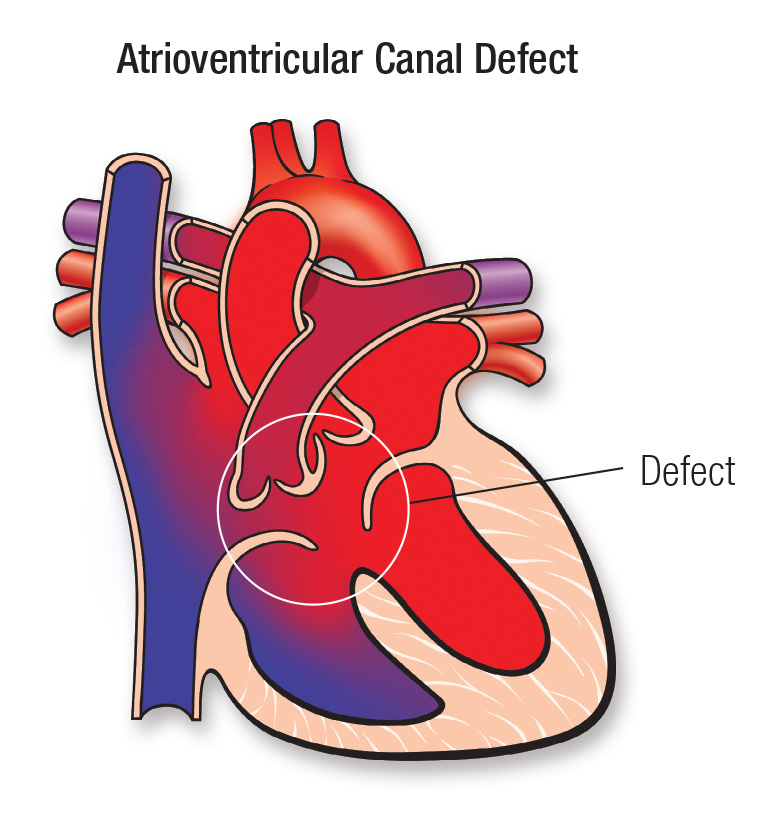Atrioventricular Septal Defect
What is atrioventricular septal defect?
Atrioventricular (pronounced A-tree-oh-ven-TRIK-yu-lar) septal defect (AV septal defect) is a condition in which the center of the heart is not fully formed at birth.
A normal heart has 4 chambers — 2 upper chambers, called the right and left atria, and 2 lower chambers, called the right and left ventricles. Between the atria and ventricles are valves (atrioventricular valves). The tricuspid valve is on the right, and the mitral valve is on the left.
 This is a normal heart. In AV septal defect, there is a hole between the right and left atria and a hole between the right and left ventricles. The valves between the atria and ventricles are not formed as they should be.
This is a normal heart. In AV septal defect, there is a hole between the right and left atria and a hole between the right and left ventricles. The valves between the atria and ventricles are not formed as they should be.In AV septal defect:
- There is a hole in the wall between the right and left atria (atrial septal defect, ASD).
- There is a hole in the wall between the right and left ventricles (ventricular septal defect, VSD).
- The atrioventricular valves are not formed as they should be. Your baby may have just 1 larger valve in the middle of their heart instead of 1 valve on each side of their heart.
 From heart.org. ©2009, American Heart Association, Inc.
From heart.org. ©2009, American Heart Association, Inc.Together, these problems may make a hole inside the center of the baby’s heart. As a result, blood does not flow the way it should between the chambers, so the heart has to work harder to pump blood to the lungs and the rest of the body.
Surgery can repair the hole and create normal blood flow. If not repaired, AV septal defect can lead to serious health problems, like high blood pressure in the lungs and heart failure.
AV septal defect is also known as atrioventricular canal (AVC) defect or endocardial cushion defect.
-
What causes AV septal defect?
It is normal for babies to have holes between the atria and the ventricles while the heart is forming in the womb. These holes should close by the time the heart is fully formed, around week 7 of pregnancy.
About 2 in every 10,000 babies are born with AV septal defect. Most of the time, it is not clear why this happened. In some cases, it may relate to a genetic condition such as Down syndrome.
Heart Center at Seattle Children's
What the symptoms of atrioventricular septal defects?
AV septal defects range from small to large. Small defects might cause only mild symptoms. It depends on how much blood moves between the heart chambers.
Most children with AV septal defect have symptoms within the first several weeks after birth. Rarely, some have no symptoms until later in childhood.
AV septal defects can cause symptoms such as these:
- Fast breathing
- Shortness of breath or working hard to breathe when feeding
- Arrhythmia
- Sweating, especially with feeding in infants
- Failure to thrive
- Trouble exercising
- Fatigue
- Palpitations
How are atrioventricular septal defects diagnosed?
Sometimes doctors can diagnose this condition in a developing baby before birth. They might first see something different about your baby’s heart on standard prenatal ultrasound. To learn more about your baby’s heart, you might have a fetal echocardiogram (an ultrasound done to check the heart more closely). Seattle Children’s Fetal Care and Treatment Center team can care for you when you are pregnant if your developing baby has a known or suspected problem.
To diagnose AV septal defect after birth, your child’s doctor will examine your child, check their heartbeat and listen to their heart. In children with AV septal defect, doctors can often hear a heart murmur.
The doctor will ask for details about any symptoms your child has, their health history and your family health history.
Your child will likely need tests, such as echocardiography, an electrocardiogram or chest X-rays.
They may need other tests that provide more information about how their heart looks and works. These might include an MRI (magnetic resonance imaging) of the heart and cardiac catheterization.
How are atrioventricular septal defect treated?
Most children with AV septal defects have symptoms that show their heart is not pumping blood normally and they need surgery to fix the defect. Your child’s surgeon will close the holes in the heart walls using patches and divide the central, or common, valve into 2 valves: 1 on the right and 1 on the left.
The details of the surgery will depend on how severe your child’s defect is. We will make a surgical plan to meet your child’s needs and explain the steps.
Before the surgery, some children with AV septal defects have heart failure, and they need medicine to help their heart pump blood better. After surgery to repair the defect, children no longer need heart failure medicines. Your child’s team will make a plan to carefully wean your child off these medicines.
After your child recovers from surgery, it will be important for them to keep seeing their cardiologist on a regular schedule to check their heart health. It is not unusual for people with a repaired AV septal defect to need a heart valve replaced later in life or to develop a narrow spot below the valve that leads out of their left ventricle (subaortic stenosis). With regular visits, your child’s team can check for early signs of conditions like these and make sure your child gets the care they need.
Why choose Seattle Children's for atrioventricular septal defect treatment?
-
Among the nation’s top programs
Our surgical outcomes are among the best in the nation year after year. See our outcomes for AV canal repair.
-
Care from before birth through young adulthood
- If your developing baby is diagnosed with AV septal defect before birth, our Fetal Care and Treatment Center team works closely with you and your family to plan and prepare for the care your baby will need.
- Your child’s treatment plan is custom-made. We plan and carry out their surgery based on the specific details of their heart defect. Some children need treatment for heart failure before we repair their defect, or they need a heart valve replaced later in life. We closely check your child’s needs to make sure they get the care that is right for them at every age.
- We have a special Adult Congenital Heart Disease Program to meet your child’s long-term healthcare needs. This program, shared with the University of Washington, transitions your child to adult care when they are ready.
-
Support for your whole family
- We are committed to your child’s overall health and well-being and to helping your child live a full and active life.
- Whatever types of care your child needs, we will help your family through this experience. We will discuss your child’s condition and treatment options in ways you understand and involve you in every decision.
- Our child life specialists know how to help children understand their illnesses and treatments in ways that make sense for their age.
- Seattle Children’s has many resources, from financial to spiritual, to support your child and your family and make the journey as smooth as possible.
- Many children and families travel to Seattle Children’s for heart surgery or other care. We help you coordinate travel and housing so you can stay focused on your child.
- Read more about the supportive care we offer.
Contact Us
Contact the Heart Center at 206-987-2515 for an appointment, second opinion or more information.
Providers, see how to refer a patient.
Related Links
- Adult Congenital Heart Disease Program
- Heart Center
- Heart Failure Program
- Heart Surgery
- Fetal Care and Treatment Center
- Single Ventricle Program
Paying for Care
Learn about paying for care at Seattle Children’s, including insurance coverage, billing and financial assistance.


